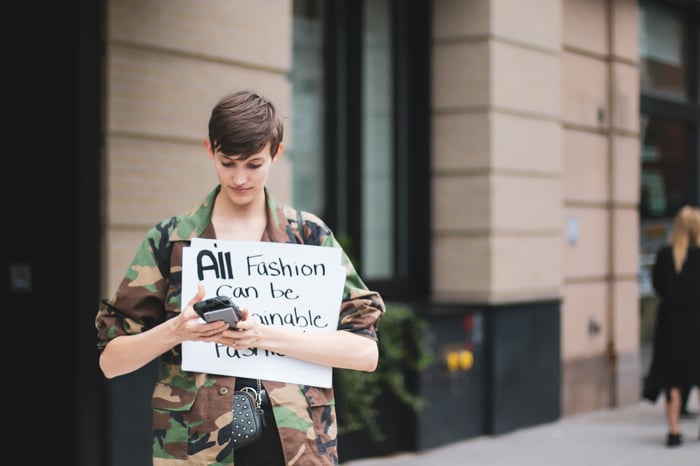 Photo: Following NYC
Photo: Following NYC
An ambitious law aims to bring new standards to the fashion industry in the state of New York. And it could have major implications for the industry at large.
Sponsored by State Senator Alessandra Biaggi and Assemblywoman Anna R. Kelles, a proposed law in New York, the Fashion Sustainability and Social Accountability Act (Fashion Act), would require big fashion brands to be held accountable for their carbon emissions and their role in the climate crisis.
The proposed legislation has received support from a who’s who roster of sustainability-focused nonprofits including the New Standard Institute, the Natural Resources Defense Council and the New York City Environmental Justice Alliance. It’s also being supported by the leading voice in sustainable fashion: Stella McCartney.
See also: 5 vegan alternatives for silk if you love “silky” soft fabrics
The Fashion Act
For companies that do business in New York with revenue that surpasses $100 million annually, they would be required to increase transparency and disclose details such as what part of their supply chain holds the biggest impact for social and environmental impact. That includes energy use, emissions production, water and chemical management, as well as fair wages and labor issues.
The companies would be required to disclose details for at least 50 percent of their supply chains, including where they source raw materials to production and shipping practices. Companies would also be required to disclose their material uses and what percentage of their sales come from which materials.
 Photo: Stella McCartney
Photo: Stella McCartney
“As a global fashion and business capital of the world, New York State has a moral responsibility to serve as a leader in mitigating the environmental and social impact of the fashion industry,” Senator Biaggi said in a statement. She says the proposed law is “a groundbreaking piece of legislation that will make New York the global leader” in holding the fashion industry “accountable.” She also said that the act would ensure that “labor, human rights, and environmental protections are prioritized.”
If passed, fashion labels would have 12 months to comply; violations would bring steep fines—as much as two percent of annual revenues. The fines would support a community fund managed by the Department of Environmental Conservation and used for environmental justice projects.
See also: A guide to eco-labels so you don't get greenwashed
Sustainable fashion
The move comes as the demand for sustainable fashion continues to rise. Driven predominantly by Millennials and Gen-Z shoppers, fashion brands across all sectors are making shifts to their supply chains and offerings. The move is being led by the luxury sector with brands following McCartney’s lead.
A growing number of brands are now embracing efforts to meet Paris Agreement targets to reduce emissions. Last year, for example, saw Louis Vuitton launch its first unisex shoe made with sustainable materials. Hermès, long a champion of leather, announced it had partnered with Bay Area mushroom leather startup MycoWorks. Last September, French luxury label Chloé became the first luxury label to earn B Corp certification. The certification measures efforts across sustainability and human rights issues.
 Photo: Chloé
Photo: Chloé





